New Delhi: Twenty-four-year-old Arvind Sonwar roams around Karol Bagh metro station to spot the people who are looking for UPSC coaching institutes. Like a vendor pulling in customers at Janpath and Palika Bazaar, Sonwar has an eye for students flirting with the UPSC dream. “Are you looking for UPSC coaching?” he asks in Hindi. A mere ‘yes’ makes him start his induction even as the air is filled with traffic noise. It is almost like a sales pitch that often has a sense of urgency tied to it—it’s now or never.
He is selling the great IAS-IPS-IFS-IRS dream to India’s youth like a car salesman.
“You will get a test series and a mentorship programme. Seats are filling fast. Do one thing, just come to our office and the founder sir will tell you the rest. He cleared this exam, he was an IRS officer,” says Sonwar.
Arvind Sonwar is just a cog in the machine the UPSC coaching industry has become today. He’s a footsoldier of a coaching institute’s marketing team. But the way he hustles speaks of the massive, hyper-competitive and pressure cooker environment of India’s Rs 3,000 crore UPSC coaching industry that began as unorganised setups but are today run like corporates. Price wars, talent spotting, hunting for celebrity-faculty endorsers and aggressive marketing and PR – the UPSC coaching industry has all the ingredients of legendary cola wars. It has become so big that it is now promising impossible dreams to unsuspecting desperate youth and the government is starting to take an interest in this too.
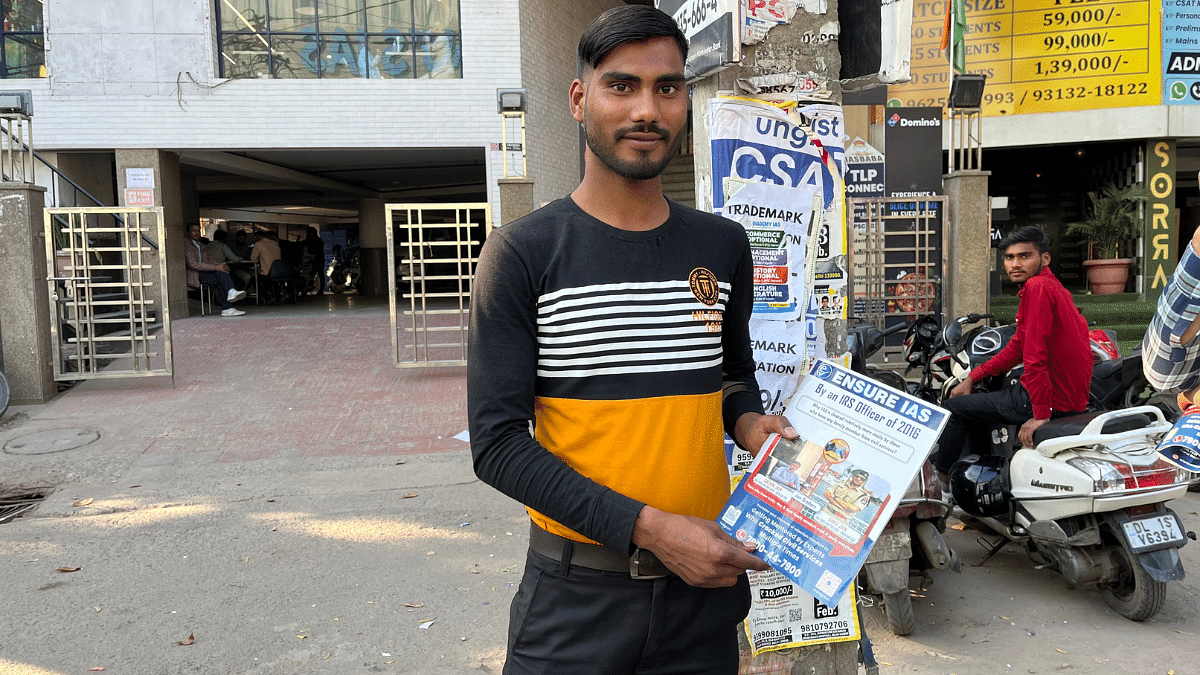
For institutes, the catchment area is huge. The number of aspirants taking the coveted exam has doubled in the past decade—from five lakh in 2012 to over 11 lakh in 2022. Add to that the state services exams and the market is as big as the sea. What makes UPSC attempts nothing short of a gamble is that the number of positions has remained almost stagnant over the years. There were 1,022 posts in 2022, down from 1,091 in 2012. With these kinds of ratios, it’s almost like getting into the national cricket team where only 11 make the cut to represent India. Where failure is not an exception but a rule here. It is this vulnerability arising out of the stiff competition that has come to be exploited by some of the institutes.
Last year, the Central Consumer Protection Authority (CCPA) sent a notice to around 20 coaching institutes about “misadvertisement”. After this, the DoPT had said the selected candidates can’t make contracts with coaching institutes. The education ministry has also released regulations for the industry.
The last 20 years have seen a dizzying boom, or what some may call an unsustainable bubble. The industry has metamorphosed into a behemoth. From teacher-oriented to revenue-oriented, many new verticals have come up at institutes. And teachers are no more anonymous.
There is a star lineup: Awadh Ojha, Vikas Divyakirti, Khan sir, the list is long. And the institutes have turned into well-oiled modern corporate-style machines. They have targets, long working hours, and diverse teams that look at various aspects of the coaching business.
Marketing teams look at ads, graphics teams generate graphics for videos that go into course material and social media posts. Some even have PR teams that help them promote their brand.
The coaching industry was free from the government’s eye for a long time. But when the government saw that the industry needed some rules and regulations, it released an advisory. From sending notices to coaching institutes to issuing guidelines, these institutes have now come under the government’s radar.
Nearly two decades ago, the government made changes to IIT entrance exam rules, limiting the number of attempts to two with the test’s focus on school syllabus. The idea was also to reduce the dependence on coaching institutes. That plan clearly hasn’t worked, be it IIT coaching or UPSC. Because it couldn’t control them, it now wants to regulate.
The UPSC coaching market is overheating and overpromising, not unlike the ed-tech platforms such as BYJU’S that crowded the market in recent years.
“The government has seen that this industry has money. Just like the crypto and gambling apps, the government will do something about it too,” says a source in the coaching industry on condition of anonymity.
Also read: Some UPSC aspirants don’t quit Mukherjee Nagar even after failing. They become the bhaiyas
Big money, IAS faculty
One look at the full-page newspaper advertisements by the UPSC coaching institutes indicates big money, big stars, and bigger dreams.
Newspaper advertisements, topper photos on hoardings, and social media posts—coaching institutes invest a lot in advertisements. They offer staggering big money to those who have been selected or and those who have retired as a bureaucrat.
“I was offered Rs 2 lakh per month just to take two mentorship sessions every week that lasted for one hour,” says an IAS officer who also took coaching during his preparation days, on condition of anonymity.
And the premium salaries being offered to the star teachers run into crores. As for retired bureaucrats, many remain in high demand at such centres. Bureaucracy often breeds jobs for bureaucrats, the education industry is a new avenue for them.
“You are being offered lakhs of rupees just for your picture in the ads and for the guidance you offer to the student,” says a retired officer.
But it is not always the direct monetary benefit that is up for grabs.
“They make different types of deals, sometimes institutes buy their (bureaucrats’) books in return for their services and the brand image that they leverage,” says a source in the coaching industry on condition of anonymity.
The teachers, toppers, and retired officers are the shining façade of the coaching world. What lies behind this gleam is the daily death of dreams, cutthroat competition, predatory pricing and aggressive marketing strategies that draw in new clients.
As the big metro markets saturate and Covid-19 established the study-from-home culture, coaching institutes are out to capture this untapped market via online mode. They promise affordable fee structure.
After Covid-19, the importance of online coaching has increased, and with the online coaching models, these institutes have reached the small towns of the country with affordable fee structures. But these institutes survive only on revenues and investments.
The virus stopped the world but not the UPSC coaching industry. Aspirants were looking at every corner of the internet to find study material and teachers. They had abandoned coaching hubs but not their dream. As the online classes model generated profits, the institutes made sure to extract as much as they could from the aspirants.
A Vikas Divyakirti or Vijender Chouhan poster can easily pull students to the mecca of UPSC hub, that is Mukherjee Nagar. But selling a course to an aspirant sitting thousands of kilometers away in Bihar’s Motihari is more challenging.
“In online coaching institutes, it is the sales team that gets 70 per cent of admissions for the institutes. Things are a little different with offline coaching institutes, teachers, and study material matter more there,” says Amit Kilhor, who is a faculty at Study IQ, an online coaching institute.
Also read: Nothing ‘kazual’ about Vijender Chauhan—man who’s helping UPSC aspirants crack the interview
‘More than coaching institutes’
The coaching industry promises lakhs of India’s unemployed youth an opportunity to get into an elite service, and in that process, ends up providing thousands of jobs. Profiles that are far removed from the dream job they have been hired to sell.
The ed-tech and UPSC coaching industry is employing people from all sorts of backgrounds, including social media, MBA, video editing, digital marketing, etc. Even the UPSC negatives — those who could not make it — are absorbed.
“These are no more just coaching centres but a complete ecosystem – coaching, mentoring, accommodation, food, content, publications, huge media, internet-based services, etc. are all included. It has made success almost impossible for those who are not connected to it,” says Vijender Chauhan, an educator who takes mock interviews of UPSC aspirants.
Many people now see ed-tech content as full-time work, he added.
When 26-year-old Arti landed a job in a coaching institute’s sales department, she didn’t know she would have to make cold calls and sell the courses to meet her weekly targets. She had to counsel students over phone calls and make false promises.
The institute used to give her a list of potential students interested in taking coaching classes for civil services.
But not every coaching institute has a sales team. It is mostly seen in online-based coaching.
Also read: Khan sir, Ojha sir, Study IQ to NEXT IAS—an aggressive UPSC coaching market war is on
The second-most important team
Making students win the UPSC battle requires an army. For coaching institutes, it is their content writers, the second-most important team after the faculty members. They pour hundreds of articles, books, lectures every day to pull out information that is relevant for an aspirant. They must toe the syllabus line carefully, ensuring curated content that gives students an edge.
Delhi-based NEXT IAS has dedicated four rooms for its content writers at its Karol Bagh office. From current affairs, weekly notes, test series, subject-specific notes, previous years’ question papers, to topic-based content, the list of assignments they work on is endless.
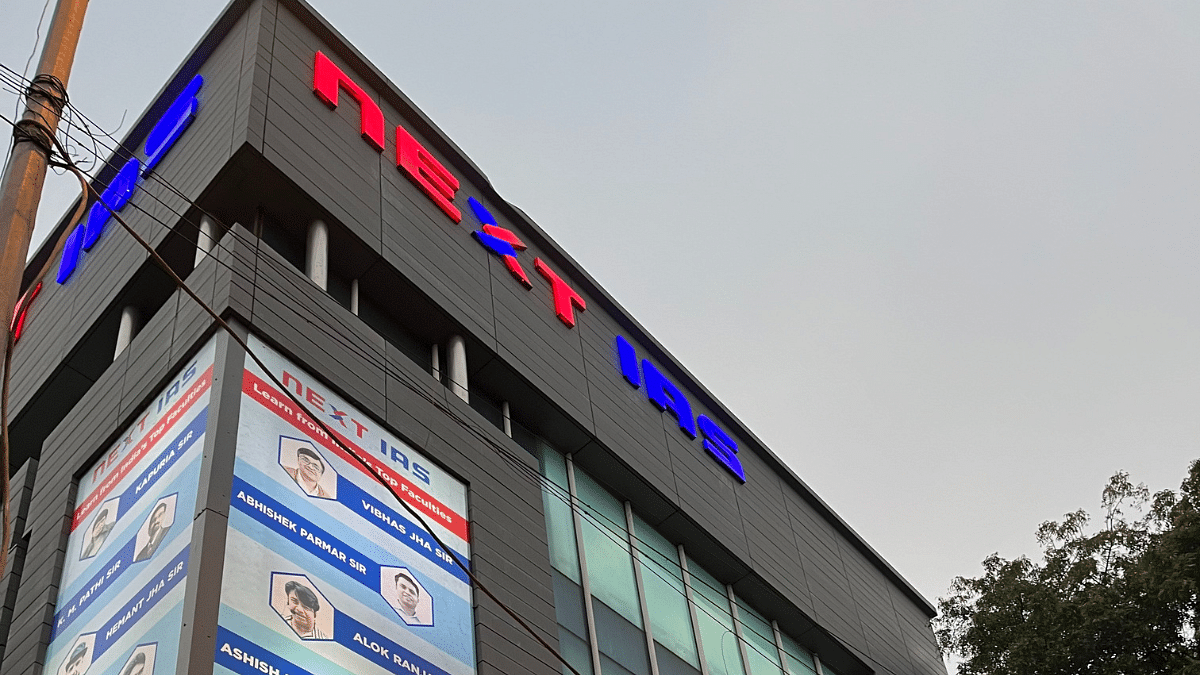
“We work as per the student’s needs. Content teams research different current affairs topics. They read newspapers, court judgments, and government sites. There are three layers of reviewing the content before publishing,” says the head of a content team at a renowned UPSC coaching institute.
As soon as the Supreme Court released its verdict on electoral bonds, the content writers started their research on the topic. And within a few hours, the material was ready. What came out was an explainer article with subheads reading ‘Why in the news’, ‘about’, ‘benefits’ etc.
“Every coaching institute has its own unique structure in which they publish their study material. We present the matter in the context of the exam. We give history, pros, cons, etc,” says the content head quoted above.
Most of the people who work in these teams are former aspirants and above the age of 30. They fit the role well, they have been in the same shoes aspirants are in today. “The eligibility criteria in most of the institutes for this role is that the candidates must have written the UPSC main exams. We assign the work only after knowing their optional subject and their area of interest,” added the content head.
Neha Sharma, 25, works from home for a renowned online coaching institute. Her day starts at 10 am and the first thing she does after waking up is to check her phone for messages from her team leader briefing her on her day ahead. Her work involves writing articles on the exam – be it a 101 on prelims or the number of selections that year.
Sharma starts by researching about the topic, and ChatGPT is her best friend. A simple voice command asking ‘last five years’ question papers’ throws immediate results for her.
“I write articles on exam notification, pattern, number of vacancies and aspirants appearing, eligibility criteria etc. I write articles for their online website,” says Sharma.
Each website has its own design and pattern filled with tons of details on UPSC, from syllabus to notifications and answer keys for the previous exams. They answer every question beginners may have:
‘What are the subjects of UPSC?’ ‘Can an aspirant download the UPSC syllabus in Marathi?’ ‘Is the IAS syllabus tough?’ Almost like an online Sarojini Market of UPSC material.
‘Latest Current affairs, UPSC Syllabus, State PCS’, reads the different tabs of the websites.
Social media channels are a little different, though. They offer light content through memes and trending reels, motivational videos, shorter versions of the teacher’s lecture, and some daily quizzes to engage students. “What is the position of the right to property in India?” asks a poster on one of the renowned coaching centres’ Instagram accounts.
There are two types of content in coaching institutes. One is static, under which they publish subject-wise books. The second is dynamic, which involves writing weekly and monthly magazines and day-to-day PDF material.
Some institutes also have an operational team that ensures wider audience reach.
Thirty-two-year-old Ashish Sharma (name changed) worked as a content writer at Vision IAS for three years. He started with a modest sum of Rs 15,000 per month. When he left the job in 2019, his salary was Rs 57,000. His job involved translating English content into Hindi. He had tight deadlines to meet, and no fixed week off.
“It used to be an informal affair in the beginning, but by the time I left the job, it had become streamlined and formal. There were more management roles, more work, and vacancies for people because there were more aspirants,” says Sharma.
Sharma came to Delhi to prepare for UPSC in 2013. He made his first attempt in 2014 and gave his first mains in 2015 but couldn’t clear it. One of those days during a lecture, the teacher announced that they were looking for some people who could translate English material to Hindi.
“I wanted money and the job was at the coaching centre itself. I thought I would be connected to the UPSC ecosystem while earning money, but it didn’t work out that way,” says Sharma.
As time passed by, part-time work became full-time, burying his UPSC dream.
“With time, I understood that learning for study and learning for work is different. I was seeing other aspirants doing better. I was stuck. That’s when I decided to leave this industry,” says Ashish whose UPSC journey ended after two attempts.
Arti graduated from Delhi University and spent three years doing different kinds of jobs in travel agencies and coaching institutes. She never prepared for UPSC, but now knows everything about it. Coming from a small town like Indore, Arti couldn’t dream of becoming an IAS officer. Now, she guides her cousins on how to go about it.
“Whenever I go to my hometown, I tell my young cousins to opt for this exam. I have seen closely how people’s lives have changed. I can’t do it, but other family members can,” says Arti.
While she is looking for other jobs now, she remembers everything about the UPSC world. At the institute where she worked, she earned Rs 100 for every new admission she brought. The work involved selling UPSC courses over phone calls.
A near-impossible dream
UPSC is a near-impossible dream—as Herculean as winning an Olympic gold. Millions of Indian families hooked on to this dream are sending their children to the UPSC treadmill. It is their way out of poverty and to gain power in society.
“I have spent almost Rs 10 lakh in the last four years of my preparations. Now, I try to limit my expenses. But Delhi is not cheap. Money and mental health, we compromise both for this exam,” says Sagar Chauhan, who has been living in Old Rajinder Nagar since he started preparing.
Cracking the UPSC exam, millions of parents perceive, can give access to a ladder that takes their kid and with them the family to the top of the social strata. Or fetch a handsome dowry. A few success stories that are far and few inspire them to fight all odds and devote the most productive years of their lives chasing the impossible dream. While success can propel aspirants overnight into a different power league, failure means making lifelong adjustments. Worst of all is entering a job market with little skill under their CV. For many, it’s a 12th Fail script in real life.
“Vidhu Vinod Chopra’s 12th Fail is the story of a single extraordinary hero, but these hubs are filled with the side characters like Guddu Bhaiya, who opened a tea stall, and Manoj Sharma’s friend Pandey who became a writer later,” says Kilhor.
A rags-to-riches underdog story is a good entertainer. But nearly 50 per cent of the selected candidates belong to the government officials’ families. According to data from Lal Bahadur Shastri National Academy of Administration (LBSNAA), the country’s top services training academy, the fathers of 166 of the 326 officer trainees (OTs) — 50.9 per cent — who took the foundation course in 2019 belonged to government services.
“These prophets of UPSC sell you that one success story without telling you that 99 per cent aspirants’ dreams are being buried under this UPSC graveyard. They are not telling you about the failures,” says Kilhor.
But that’s not stopping the spread of buildings running coaching institutes in Karol Bagh and Mukherjee Nagar.
Mukherjee Nagar’s skyline is an advertisement canvas showcasing star teachers and success stories of students, staring constantly at their next client. And the canvas keeps changing according to the season and cycle of the UPSC exam—preliminary, mains, and the interview.
Mukherjee Nagar is like a small planet of these aspirants. On their toes all the time, the aspirants spend their days in libraries. And during breaks, they run for their comfort food — chai and momos. They do a quick check on friends and their preparations during these breaks.
“When I started working, there weren’t as many institutes as we see today. I have seen this place grow,” says Sonwar.
Pointing at a newly constructed three-story building, he says, “This will also be a coaching institute soon.”
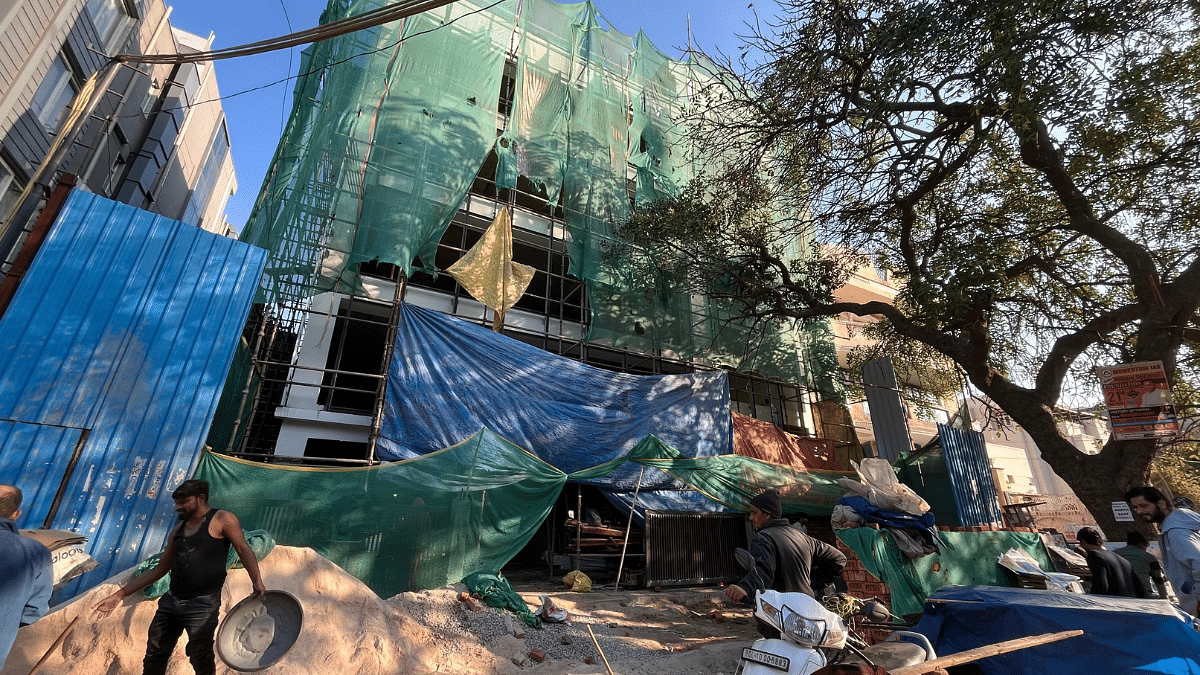
With a UPSC coaching institute in every gully of Mukherjee Nagar and Karol Bagh, Delhi is slowly becoming saturated. And that’s forcing institutes to reach regional markets. They are promising to build Mukherjee Nagars in every state capital—from Patna to Indore and Jaipur. And the aspirants are lapping it up too. Not travelling to Delhi and renting a room in Mukherjee Nagar or a Jia Sarai does save a lot for them.
The addiction
The UPSC cycle is addictive. The whole process takes one year to complete. Most enter this world thinking they won’t spend years in the bylanes of Mukherjee Nagar. But hope and the constant caution surrounding exhaustion of attempts keep them in the hunt for long, long enough for many to lose an entire decade.
Lakhs of people get out of this cycle every year, defeated and with low self-esteem. But some pull themselves together and try to use their preparation experience in different fields like teaching and social services. Those who still have energy left opt for state services.
Rajat Sambyal spent 10 years of his life preparing for UPSC and reached the interview stage. But he couldn’t clear it. He then moved toward state services and cleared JKPSC CSE 2022.
But 33-year-old Kundan Kumar is still struggling. He spent eight years and got nothing in his hand. After failing in his last attempt, he had to return to his native place Darbhanga, where he is still looking for job opportunities.
“I had to take depression pills to get myself out,” says Kumar.
Banking on ads and money
The coaching industry wasn’t as big and loaded with money as it is today. Social media, the complexity of the exam, and the large number of aspirants shaped it.
“There were very few coaching institutes back in the day. We used to see the advertisements on the hoardings, but it was not this crazy. The pattern of exams has also changed over the years. We took the CSAT exam in 2011 and the difficulty level is increasing every year. The need for guidance is increasing too. Coaching centres are providing guidance, counselling, and study material to make this journey easy,” says Kilhor.
But retired IAS officers who entered the services decades before the coaching boom don’t think students need this ecosystem.
“I joined a coaching institute and left it in four days, as I didn’t find it fruitful. I think guidance is more important than coaching. Institutes are teaching the subjects, but what students need is knowledge, and analytical and communication skills,” says retired IAS officer Anil Swarup.
There are also those from within the fraternity who don’t approve of former bureaucrats becoming the face for these coaching institutes. “In the last 15 years, this coaching industry has become such a big pain. And so many bureaucrats running these centres holding out hope to hundreds of kids is not right. Nine out of 10 students will not make it, no matter how much coaching they get,” says former IAS officer Shailaja Chandra.
Sometime last year, Abhinav Siwach, IAS officer in the DANICS cadre, was chased with a question, both in his office and over the phone: Which all coaching institutes did he attend before entering the services? Siwach was pestered, his face used by a number of coaching institutes, claiming a pie of his success. Every newspaper has his face.
“For this attempt, I did not go to any coaching centre. Although I did take some notes from one coaching centre and gave mock interviews,” Siwach had told ThePrint last year.
Every time UPSC results are declared, newspapers and hoarding boards are flooded with the photos and ranks of successful candidates. Most of the time, the candidate has no clue about it. The advertisements embellish and tweak facts.
To feature in these ads, the toppers aren’t required to have enrolled into the course or even attended a coaching class. Even a brief, fleeting last-minute engagement is enough, like buying test series or notes or appearing for a mock interview.
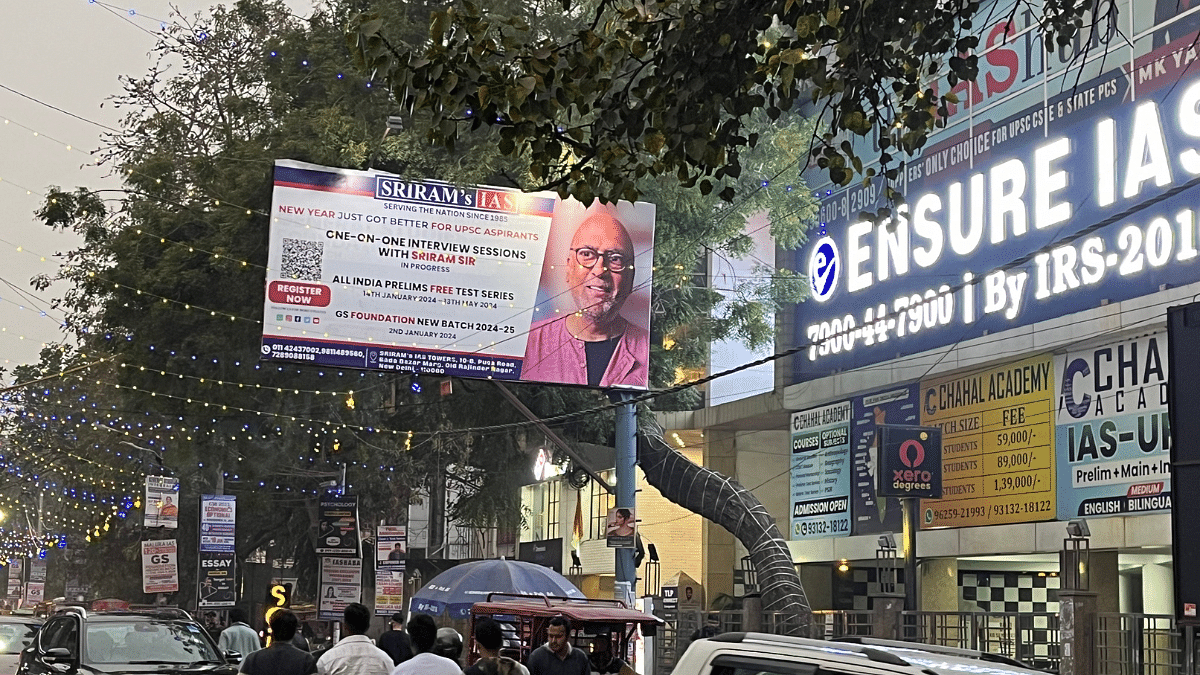
There is a booming coaching centre industry today, but it all started with a small goal: To give guidance to aspirants.
For example, Vikas Divyakirti started teaching students in a hostel room, but later, batches expanded, and now, Drishti IAS is one of the biggest names in the UPSC coaching industry.
“Vikas used to teach students in one room. These students needed help and he loved teaching, and it evolved with time. Drishti was the first institute that started taking mock interviews for Hindi aspirants,” says Chauhan.
One of the oldest coaching institutes, Rau’s IAS started teaching students in 1953 but now all these institutes are big fish of this industry that continues to boom despite the failures of lakhs of students.
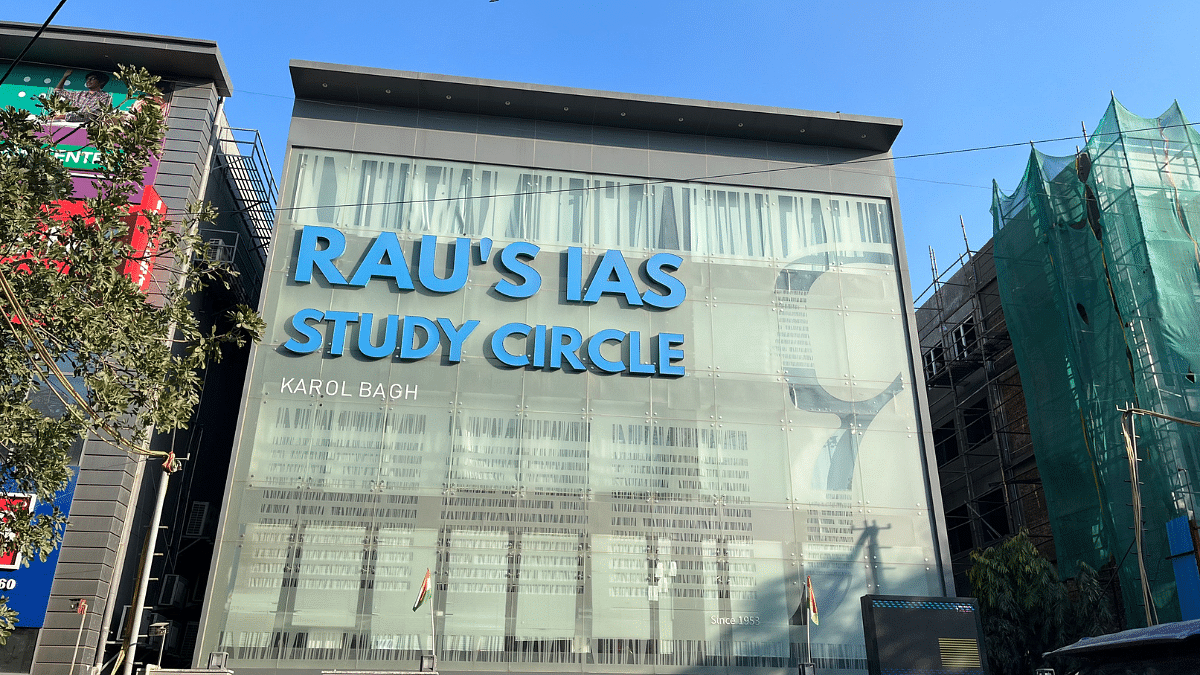
The coaching industry runs on a thin promise and exchange of big money. After spending lakhs of rupees, there is no skill addition at the end of the day. It’s a gamble few are willing to call out.
“All these big coaching institutes are teaching 5,000-10,000 students in a year, they charge Rs 2-3 lakh as fees every year, something most premium colleges of India charge. Of these, only 20/30 students are going to succeed,” says Kilhor. If that would have happened at a university that charges so much money, we would declare that an official fraud,” says Kilhor.
(Edited by Anurag Chaubey)


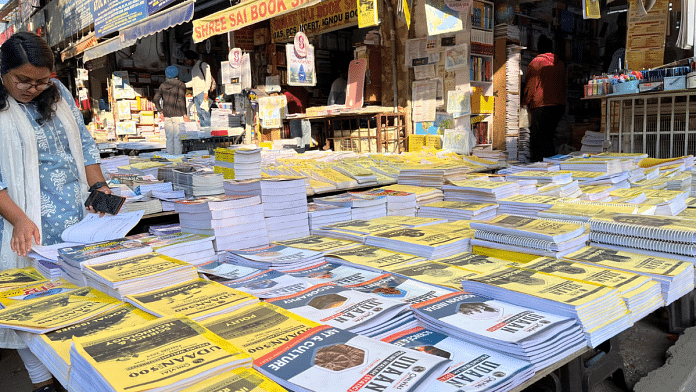

UPSC ALONG WITH IT’S COACHING CLASSES MUST DISCONTINUED OR BANNED BY THE NEXT MODI GOVT- IT HAS OUTLIVED IT’S INITIAL PURPOSE.